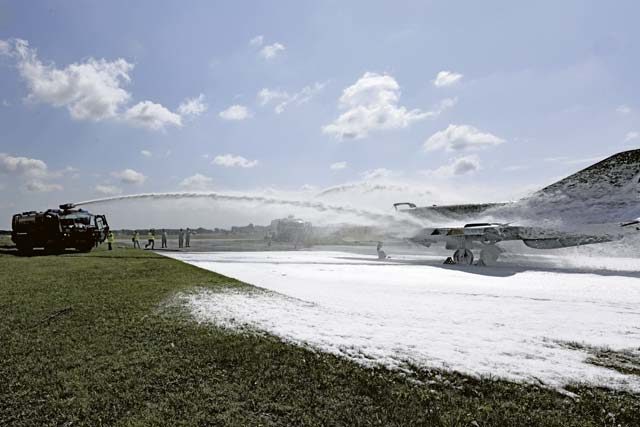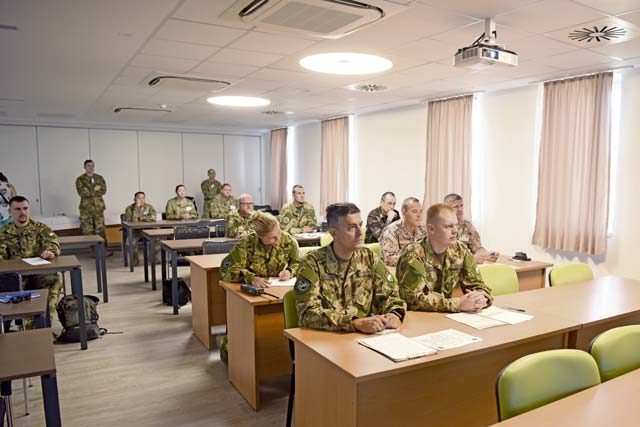Story and photos by
Senior Airman Milton Hamilton
86th Airlift Wing Public Affairs

The 435th Contingency Response Support Squadron’s air advisors flight, in conjunction with the Ohio Air National Guard, conducted a bilateral training exercise with Hungarian, Latvian and Croatian military personnel at Pápa Air Base, Hungary, July 15 to Aug. 1.
This is the second annual air advisor’s event, after Hungarian and regional partners implemented several suggestions made by the 435th’s CRSS in 2018.
This year’s exercise provided Hungary and regional partners with intermediate-level airfield management capabilities, as well as a familiarization with flightline safety procedures and occupational health.
Air advisors used workshops and flightline exercises to achieve the objectives.
“We brought several members to work with the 435th CRSS and to train in airfield management and air traffic control scenarios, but the bigger objective is the partnership between militaries,” said Ohio National Guard Brig. Gen. Todd Audet, assistant adjutant general, Columbus, Ohio.
Ohio has had a partnership with Hungary for 26 years and since arriving in Hungary, Audet said he has seen that partnership strengthen.
“This exercise was just another opportunity to both share our Airmen’s skills and provide training,” said Audet. “The 435th CRSS is doing a phenomenal job and our Airmen have learned a lot working with their air advisors.”
After the success of the first training exercise, the Hungarians asked the 435th CRSS to come back to conduct more workshops on airfield management, and to begin conversations about Air Force procedures in occupational health.
“Last year when we were here the Hungarians identified a need for occupational health, so they requested we come back to conduct a knowledge exchange,” said U.S. Air Force Capt. Claude Betene-A-Dooko, 435th CRSS air advisor flight commander. “This year we learned more about their program and told them about ours, in order to decide what kind of training we could provide to them.”
To gather information about the Hungarian military’s occupational health program, a key leader engagement was conducted during the 435th CRSS mobile training team event, which involved collecting information from students and decision makers.
“We sat down with the Hungarian military’s Deputy Surgeon General and Chief of Operational Medicine to gain a better understanding of the occupational health program in the Hungarian defense forces,” said Betene-A-Dooko.

When asked why occupational health is important Betene-A-Dooko said, “Occupational health is very important because it identifies and measures risk, and provides safety training to Airmen. It also delivers detailed information to medical providers, so they can offer medical care that is specific and adapted to the potential exposures that Airmen experience on a daily basis.”
During the mobile training team event, the Hungarian military learned the basics of airfield management, but this year’s training focused on a more intermediate difficulty.
“This course started last year with the basics and this year is just a continuation of it, said Tech. Sgt. John Morris, 435th CRSS airfield manager air advisor. “This year we taught intermediate airfield management, which is more of the back office, managerial type of work.”
Airfield managers are also responsible for the safety of aircraft, personnel, operations, and daily inspections of the airfield.
“We’re in charge of the entire airfield,” said Morris. “When we teach the Hungarians the way we conduct operations, it helps build a safer airfield environment. This allows us to use their airfield, and vice-versa, because we’re operating at the same capacity, knowing that we all have the safety criteria.”
Airfield management’s goal was to enhance the Hungarian and regional partner’s capabilities on an airfield, in and out of a deployed environment.
“Airfield management’s job is to activate the crash network and to alert all necessary agencies of danger and emergencies, so they can respond in a timely manner to mitigate any loss of human life and Air Force property, said Tech. Sgt. Andrew Lipian, 179th Airlift Wing aviation resource manager.
Lipian said enhancing the Hungarians’ capabilities allows them to diversify responsibilities so the people in the tower can focus on the air traffic.
“This asset of learning airfield management only helps them to improve their operational success by parsing out the various multifarious duties that the airfield managers can take away from the people in the tower. The airfield will be better managed by having a team of people whom are in charge of just the airfield.”
Keeping the flightline and its personnel safe is a tenuous job, requiring several agencies to work and communicate together.
“There are multiple agencies involved when there’s a flightline emergency, such as air traffic control, fire, airfield management, security forces, occupational health, and medical, said Staff Sgt. Jeremey Podzimek, 435th CRSS air advisor.
The 435th CRSS air advisors taught flightline emergency protocols, base defense, fire safety, and nine days of instruction on Air Force security and fire procedures.
“Base defense is important because it protects assets on the flightline, ensuring nothing unwanted gets into the base or onto the flightline,” said Podzimek.
Lipian said overall the training exercise was a success, with all participating nations leaving with a stronger partnership and enhanced interoperability capabilities.
“Hungary has the desire, the willingness, and the capability to enhance their flightline operations,” said Lipian. “With this new capability, we have every confidence they will be able to improve not only their air force, but NATO as well.”


